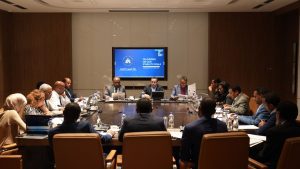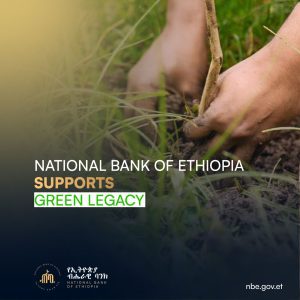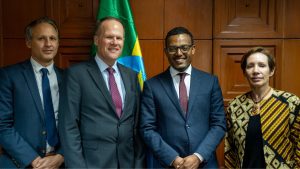Strengthening Resilience in a Changing World: Ethiopia’s Experience and Opportunities
NBE Governor’s Speech at the International Conference on the Ethiopian Economy, July 21, 2023
Invited guests, participants, colleagues, and ladies and gentlemen.
It’s a great pleasure to open the 20th International Conference on Ethiopian Economy organized by the Ethiopian Economic Association (EEA).
Let me first and foremost start by paying tribute to the Ethiopian Economic Association—perhaps the leading professional association in the country—with thousands of members, with a track record of achievements behind it and for staying engaged and relevant over the course of the past three decades or so despite I am sure several challenges and uncertainties along the way.
Indeed, the EEA that we have today has been at the forefront of solid policy research, thought leadership, and advice since day one. The EAA has been our national thinktank that helped stimulate purposeful dialogue and has been our bulwark to challenge the often unthinking and at times damaging ideology that is thrown at us with a zeal of a missionary.
For all your successes and accomplishments, I want to say congratulations!
A cocktail of challenges
Ladies and gentlemen:
The world economy has changed in dramatic and unexpected ways in just the past few years. A series of shocks have upended old realities and replaced them with new uncertainties.
- An occasion like this therefore should involve a degree of reflection about our current reality, a reflection about the future direction, and about what comes next.
- In that spirit, I want to argue that the global economy has now reached a perilous crossroad.
- Policy makers everywhere are facing a unique cocktail of challenges.
- Unique because, taken in isolation, they might not be new and perhaps arguably it is possible to overcome these obstacles. But their combination and that they happen at global scale make them particularly daunting.
First, we have a cost-of-living crisis. Inflation has risen sharply here at home and elsewhere driven in most places by surging energy, food, and fertilizer prices. Let’s take fuel as an example. This year alone, we will spend more than US 4.2 billion on fuel imports. As recently as two years ago, this was below $2 billion! So this is an extra $2bn in foreign exchange that could have been channeled to a wide range of other priorities—from capital goods, to infrastructure, to machinery and a lot else. Similarly global prices for food and fertilizer have in some cases doubled from past norms and consumed a substantially higher share of an already limited foreign exchange supply.
Second, private and public debt have now reached new highs. This was partly driven by COVID, when governments around the world provided substantial stimulus to their economies and direct support to their citizens by relaxing fiscal and monetary policies. We did the same in Ethiopia, by allowing for a higher budget deficit and looser monetary policy. Post-COVID, in most parts of the world, substantial pent-up demand as well as the lagged effect of loose fiscal and monetary policies has resulted in a surge in private sector debt across most banking systems. This is also the case in Ethiopia.
Yet another significant issue is the large drop in what were previously large financing sources for developing countries and especially for African countries. Looking at flows to Africa, in particular, three separate sources of external financing—official financing (or official aid), private sector financing by global bond markets, and financing from China— have all dropped in the last few years. It is no surprise that the IMF has called this an “unprecedented funding squeeze”—where borrowing costs have increased, cheap private capital is no more, and inflows from the largest official lender in the world—China—have for many countries simply collapsed.
Finally, what is unique for Ethiopia is the tragic domestic conflict that we unfortunately went through and that distracted us from the implementation of our Home Growth Economic Reform Program, particularly with respect to plans for fiscal consolidation and monetary restraint.
These multiple crisis—or polycrisis if you will—imply an enduring setback to years of development gains if not properly and urgently addressed.
The Ethiopian context
Ladies and gentlemen,
It is within the context of this very challenging domestic and global background that we should assess Ethiopia’s current conditions. And it is within this context that I want to briefly summarize the recent record of Ethiopia’s economic performance:
- To start with the positives, the Ethiopian economy has really proved to be remarkably resilient in multiple respects. I will come to the many problems and challenges that we still face, but allow me to first list the many notable accomplishments of the past few years:
- Economic growth still held up well, averaging close to six percent for the last three years. Our growth also remains relatively broad-based, being driven by a combination of agriculture, services, and industry.
- On the fiscal side, the deterioration in fiscal deficits has been limited; difficult subsidy reforms (particularly in the fuel sector) have been implemented helping minimize future fiscal risks; and a tight management of new SOE borrowing (including avoidance of non-concessional debt) has worked to reduce and control future liabilities.
- Treasury Bill auctions were successfully launched to provide a market-based system for domestic borrowing and despite the much higher financing cost for Government.
- Key sectors such as telecom and banking have been liberalized and are opening up for competition, all to the benefit of consumers.
- Ease of doing business reforms have been implemented in licensing, trading, and many other areas.
- The foundations have been laid for the imminent start of capital markets, with a Proclamation passed, a Capital Markets Authority established, and an Ethiopian Stock Exchange expected to become a reality in 2024.
I can go on and on…
Of course, a balanced review cannot also fail to mention the many areas where economic policy and economic outturns has fallen short. Inflation is too high, the foreign exchange situation is very difficult, debt servicing remains a major challenge (even if our debt stock is not so high), and as we all know there are a range of structural and sector-specific bottlenecks—in the ease of doing business, in logistics, in manufacturing, and so many other areas—where fundamental reform is still needed.
So, to summarize, I would say that while recent economic developments have shown a mixed picture, we are now at a more hopeful juncture as we have put a devastating internal conflict behind us and are refreshing our key economic policy frameworks to ensure economic stability and growth. There is a lot to celebrate and recognize as accomplishments (especially in the midst of very difficult global and conflict conditions) but there are also a lot of areas of economic policy that need some more work, some course corrections, some re-thinking, and some re-imagining.
This is where I think we are now and what we must address: how best can we focus on the policy areas that need some more work, some course corrections?
NBE’s roles and responsibilities
From the unique vantage point of the central bank, let me now say to where I think we can play a special role and where and how we can work jointly—with both EEA and the broader economics profession—in making a real difference:
From NBE’s perspective, we are working very intensely on three areas within our mandate: (1) restoring price and external stability; (2) championing financial sector modernization and inclusion while of course safeguarding risks, and (3) becoming a more transparent, collaborative, learning and knowledge-generating institution.
- On our first key priority area, restoring stability, the NBE is taking on this task very seriously and is working hard to make this a reality within a short period of time. To be more precise, the direction and objective of monetary policy from here on will be focused very specifically to bring inflation down. I must point out however monetary policy shouldn’t shoulder the responsibility of fighting inflation alone. The insidious damage that a high inflation regime does to the economic and social fabric is well known—it is a burden on those with fixed incomes, it hurts the most vulnerable in society, and it distorts economic decision-making in so many ways. The longer inflation is allowed to persist, the greater the likelihood that it becomes entrenched. Our priority for this new fiscal year is thus to reverse this state of affairs.
- Our second key priority is ensuring our financial sector is stable, modernized, and inclusive. All these sub-elements are mutually supportive. Stability can ensure the safety, reliability, and inclusivity of the banking system. Modernization via digitization can enhance the inclusivity of the financial system. Our current and planned openness to fintechs, to foreign banks, and by next year to investment banks and other capital market service providers will all dramatically broaden the scale, scope and range of services offered by our financing system.
- Our third priority is focused on our internal workings, including on our people and processes, and is also about upgrading our role as a learning and knowledge-generating institution. It is on this third area where I believe we can benefit from significant collaboration with institutions such as EEA and its members and where I believe we can potentially establish a true partnership.
A Call for Action
Ladies and gentlemen:
In raising the issue of collaboration, let me conclude by the following points for your reflection and consideration. First, I want to make a Call for Action—to the EEA and its members on the types of policy issues I believe it must address and engage with. Second, I want to emphasize the importance of working in a collaborative and constructive manner and mindset. And third, I want to urge us all to focus on the practical and the feasible solutions to the problems of the day without going into an unfortunate Ethiopian habit we have of taking absolutist, extremist and hyper-ideological positions. Let me say a few points on each and end my remarks.
First, on the Call for Action, I would like to sincerely request that EEA as an institution and its members to focus on some of the major economic policy issues of the day. Often times, the economic commentary that we see in the press or addressed in academic circles fails to address the many complex policy issues for which Ethiopia needs a true marketplace of ideas, contributions, and analysts. For example, and this is just meant to be illustrative:
- How can we best return to high growth without running into a debt trap?
- How can we encourage widely shared, geographically distributed, and equitable growth?
- How can we raise Ethiopia’s low savings and investment rates?
- What is the best we can do to boost crop yields? To diversify crops?
- How best can we integrate in global market place of goods, services and capital?
- How can we raise manufacturing’s share in GDP and manufacturing exports and manufacturing employment?
- What priority policy measures can be taken to boost fx resources?
- Howe can we best design our social safety net programs?
- How can we leverage our largely untouched resources in areas such as mining, in green energy, in irrigation, etc.?
These are some of the big economic policy issues of the day, and it is on these sorts of challenging policy issues that we really need a range of ideas, proposals, lessons, and recommendations. And it is precisely in these areas that EEA and is members can really make a difference.
Second, my message would be for us all to engage in constructive collaboration. We at NBE are planning to improve our data analysis and research capabilities and also deepen our collaborations with outsiders—universities, think thanks, central banks, and others. We also plan to provide a much more active and consistent sharing of data with the public and with researchers via our website and other channels to foster active and timely research. We want to re-start a more active Working Paper series, a Visiting Speaker Series, a Visiting Researcher program, a visiting student/intern program and much more. In all these, we will work to seek constructive collaborations and EEA can be a valuable partner in this journey.
Third, my message and indeed my plea would be for us to focus on practical, evidence-based ideas, proposals and solutions—rather than falling into an unfortunate habit we sometimes see of absolutist, extremist and hyper-ideological debates and positions. The key point I want to underline here is the need for practical, evidence-based ideas and research that can feed into effective policy making. Economic policy making is full of issues where simple theoretical solutions or strongly held ideological positions are not helpful but rather where careful judgements and weighing of the evidence is vital. Issues such as deciding on the size of a budget deficit, or the appropriate stance of monetary policy, or the merits or demerits of privatization, or the costs and benefits of exchange rate reform, or the use of private versus public sector solutions to certain economic challenges—I believe these are all best addressed by approaching the issue with an open mind, with recognition of the Ethiopian context, with an understanding of the realities on the ground, and ultimately with evidence-based approaches to decision-making. I hope this is the same spirit that we can all take.
Thus, to conclude, I hope EEA, its members, and the broader economics community can really collectively make a contribution to addressing the many pressing economic policy issues of the day, that we work in a collaborative and constructive spirit, and that ultimately, we all aim to be true to EEA’s own principles of evidence-based analysis, research, and inputs to good economic policymaking. And as we all know, good economic policy making—like a country being endowed with natural resources or high capital or labor resources—can ultimately make a major difference in fostering macro stability, growth, development, and improved living standards for all.
Thank you.
MAMO MIHRETU
GOVERNOR
NATIONAL BANK OF ETHIOPIA
JULY 21, 2023



